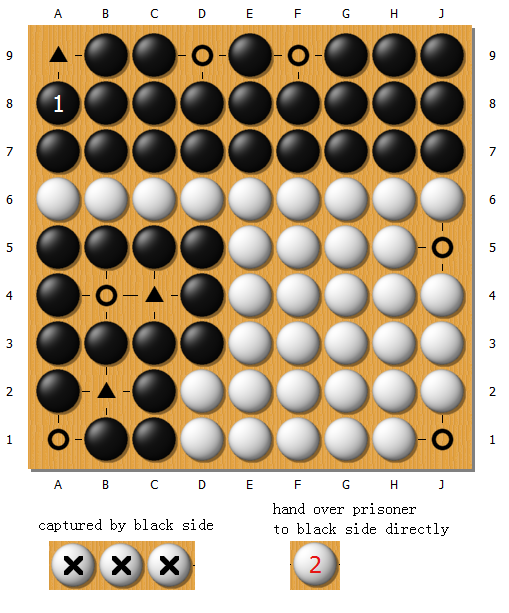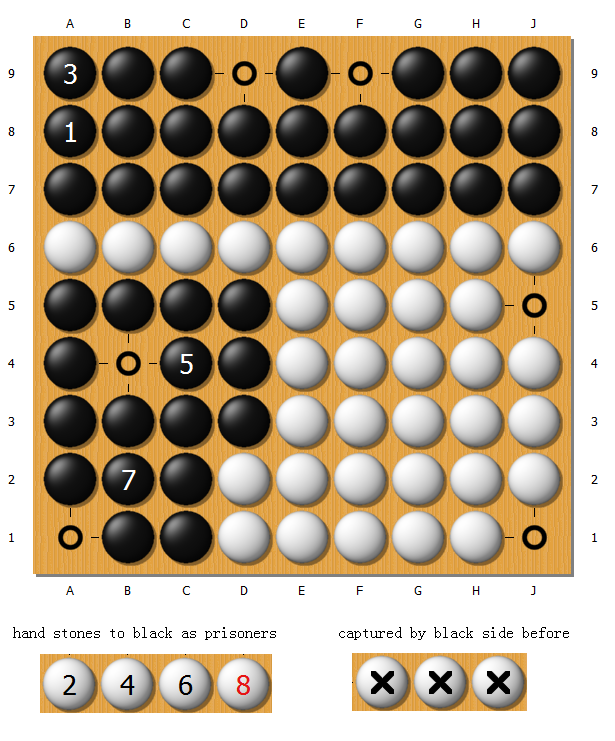Research of ancient weiqi rules in 2 Chinese classic booksauthor:Zhang hu copyright reserved"
Scoring Rules by Captives/Prisoners(计俘子规则), found by
Zhang hu(章浒)",
"If you quote my arguments, please attach the above texts and relevant contents."
Introduction & Part 1: a hidden rule in ancient weiqi rules(Song Dynasty and more early) at
https://www.lifein19x19.com/viewtopic.php?f=45&t=17865Part 2:
ancient rules in "texts & annotations" of The Thirteen Chapters Classic at here
Part 3: ancient rules in texts of Dunhuang Classic of Weiqi at
https://www.lifein19x19.com/viewtopic.php?f=45&t=17870The preparation knowledge is in part1 https://www.lifein19x19.com/viewtopic.php?f=45&t=17865,
otherwise it is not easy to understand the following content. So, please read part1 carefully first.(Part2-1 2-2 2-3 2-4 as below)
Part 2-1 of ancient rules in "texts & annotations" of The Thirteen Chapters Classicsee the whole page here:
https://www.lifein19x19.com/download/file.php?id=13558picture from the Thirteen Chapters Classic in Lan Ke Jing
Attachment:
 lankejing_3.png [ 238.45 KiB | Viewed 15724 times ]
lankejing_3.png [ 238.45 KiB | Viewed 15724 times ]
Zhang jing(张靖)'s text:
胜而路多,名曰赢局。winning(胜) by
more Lu(路多) than the other, called(名曰)
winning on the board(赢局).
comment:Lu is Chinese character 路.
means the usual situation - when scoring, just need to count Lu on the board only.see:1-1.png and 1-3.png at
https://www.lifein19x19.com/viewtopic.p ... 23#p261523please look 1-3.png, by rules of Song Dynasty:
Black side: 16 + 2 = 18 Lu,
White side: 14 - 3 = 11 Lu, (3 white dead stones are filled in white's territory)
Black wins 7 Lu.
Comment:
1. Basic liberties/eyes making group alive forever must be left.
2. As a simple method, weiqi players in Song Dynasty often directly fill the prisoners into each other's territory.
My comments:
the translation of 筹 as "counting rods" of below is not a good translation, Now I changed it to "chips". 2020/11/19 10:23 beijing time
the translation of 子 as "pieces/piece" of below maybe is not a good translation, Now I changed it to "stones/stone". 2020/11/22 01:32 beijing time
Zhang jing(张靖)'s text:
败而无路,名曰输筹。losing(败) at
none Lu(无路), called(名曰)
losing chips(输筹).
means loser has filled in all his territory on the board,and only basic liberties for group alive not be filled.
Attachment:
 none_lu.png [ 72.68 KiB | Viewed 15477 times ]
none_lu.png [ 72.68 KiB | Viewed 15477 times ]
○ are basic eyes making group alive forever, you can not fill in it,
▲ are Lu(on the board) - territory on the board in the Song Dynasty,
and we will find 1 prisoner = 1 Lu.
Above, by rules of Song Dynasty:
Black side: 3 Lu(on the board),
Black captured: 3 + 1 = 4 prisoners;
White side: 0 Lu(on the board)
White captured: 0 prisoner;
Black wins 3 Lu(on the board) and wins 4 prisoners,
the final score is: Black wins 7 Lu.
Now, we conclude:
in the Song Dynasty, people will count Lu(on the board) and must count prisoners in the same time at some unusual situations.and We find that Lu(on the board) is the ability to capture more prisoners, 1 prisoner = 1 Lu.Pay attention to this:
chips(筹) is also mentioned in Dunhuang Classic of Weiqi(敦煌《碁经》).Chips is similar as Casino Chips for exchanging, Weiqi players use it in the northern and Southern Dynasties(the times of Dunhuang Classic of Weiqi).
In the Song Dynasty(the times of Thirteen Chapters Classic), people use Lu and prisoners for scoring, they no longer use chips, but there is still a legacy of that language.
Are there any relationship between chips and prisoners? see below.
Liu zhong fu(刘仲甫) annoted:
局满而有余子曰赢筹,无余子曰实局。the board is full of stones(局满), if
there are superfluous stones(有余子), called(名曰)
winning chips(赢筹).
the board is full of stones(局满), if
there is none superfluous stone(无余子), called(名曰)
filling full the board only(实局).
Pay attention to this:
stones/stone(子) and chips(筹) are also mentioned in Dunhuang Classic of Weiqi(敦煌《碁经》).What is stone(s)(子)? chess pieces of Weiqi.
Stones/stone(子) are not just living stones on the board.Many people refer to the Chinese character - stones/stone(子), and take them for granted as living stones on the board.
It's wrong.
Stones/stone(子) have three statuses:
1. before putting on the board.
2. on the board.
3. captured by another party as prisoners.
In different status, the Chinese character stones(子) will be different meaning.When the board is filling full(局满), there are superfluous stones(有余子), "superfluous stones" means what?
status 1: It's not about scoring.
status 2: The board is filling full of stones(局满), where could I find more superfluous stones?
and please pay attention to this: at the times of Song Dynasty, people score by Lu and they don't score living stones on the board!
status 3: prisoners. Yes,it is.
So,
superfluous stones(有余子) is
superfluous prisoners.
When the board is filling full(局满), superfluous stones/prisoners(有余子) is called winning chips(赢筹).
Now we know, winning chips means winning prisoners, and losing chips means losing prisoners.
Chips represent prisoners.I will explain chips later with Dunhuang Classic of weiqi(敦煌《碁经》) at part 3.
Comment:
1. Basic eyes making group alive must be left, when the board is filling full of stones.
2. As a simple method, weiqi players in Song Dynasty often directly fill the prisoners into each other's territory.
Attachment:
 4.png [ 100.71 KiB | Viewed 15604 times ]
4.png [ 100.71 KiB | Viewed 15604 times ]
○ is basic liberties/eyes which making group alive forever, you can not fill in it.
Above, by rules of Song Dynasty:
Black side: 0 Lu(on the board),
Black captured: 3 + 4 = 7 prisoners;
White side: 0 Lu(on the board),
White captured: 0 prisoner;
the final score is Black wins 7 prisoners/Lu;
Black side is in these 2 situations:
1. the board is filling full of stones(局满), and captured superfluous prisoners(有余子) from White side, called winning chips(赢筹).
2. the board is filling full of stones(局满), and none black stone captured by the other side(无余子), called filled the board only(实局).
White side is in that situaton:
the board is filling full of stones(局满), and some white prisoners captured by the other, called losing chips(输筹).
Now, we conclude:
in the Song Dynasty, people will and MUST count prisoners only, when the board is filling full of stones(局满) both white and black sides.



